

Locker
Buying Guide
School Outfitters Tips
Measure your total available space before making a purchase. Be sure to account for things like fire alarms, water fountains or windows.
Lockers with vents circulate air and prevent moisture build up that can cause unpleasant odors and mold.
Slope-top lockers prevent clutter while flat-top lockers allow for additional storage.
A “closed-style” locker base eliminates the need to clean underneath and prevents lost items.
Consider whether you prefer padlocks or combinations locks. Padlocks are highly secure but combination locks do not require keys.
For added convenience, many lockers have the option to be delivered fully assembled.
Locker Styles
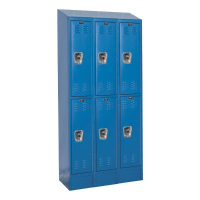
Considered a standard in schools, metal lockers stand the test of time as a highly durable option for heavy use. They are an economical solution that is ideal for volume purchases. Today, metal lockers are available in an array of color options to brighten classrooms and hallways. In addition to color choices, lockers can be corrosion resistant, quiet closing, antimicrobial and have built-in electronic locks. Some styles have up to six tiers of lockers. For added convenience, many arrive fully assembled.
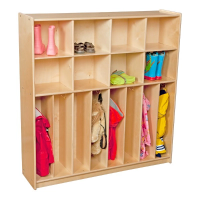
Preschool lockers help keep early learning classrooms organized and tidy, with a variety of features like open fronts, hooks to hang coats, ledges to sit on and shelving for personal items. Preschool lockers are typically made of wood with rounded corners and lower heights for easy reach. Many are also GREENGUARD Certified for low chemical emissions and CPSIA compliant for safety.
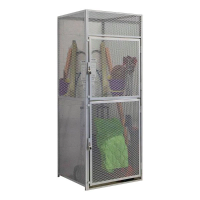
Storage and cage lockers are made of steel with mesh panels. Items can be viewed but are protected from unwanted access. The mesh openings allow air to circulate, making these lockers ideal for gym equipment, facility storage, bulk material and more. Many have shelving and are available in a variety of sizes and configurations.
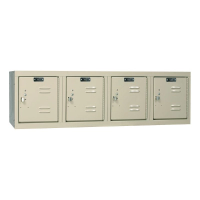
Wall and box lockers are square, cubby-like lockers. This style is ideal when space is limited. The smaller dimensions and various configurations make them a common feature in employee breakrooms, fitness clubs or teacher lounges for storing small personal items.
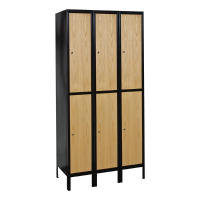
Wood lockers are commonly found in settings like employee breakrooms, fitness clubs, universities and other professional settings due to their more upscale appearance. Wood lockers are often constructed of solid wood, wood laminate or a combination of wood and metal. Laminate is a cost-effective option to solid wood, with its scratch-resistant and easy-to-clean surface that holds up well in high traffic areas. These lockers are available with and without doors and in columns or multiple tiers.
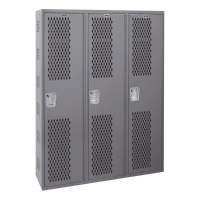
Just as the name implies, athletic lockers are designed with athletes in mind. Many have all-welded construction for ultra-durability and built-in vents to prevent odor build up. Athletic lockers that are antimicrobial and corrosion-resistant are ideal for high-moisture environments like shower rooms. Locker dimensions vary to accommodate a wide range of athletic needs.
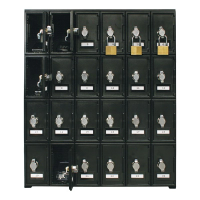
When cell phones and laptops are left unattended it can be an open invitation for theft. Cell phone and laptop storage lockers can deliver peace of mind by providing a secure place to store these devices when not in use. And, educators can eliminate distractions by using cell phone storage lockers in class. These lockers can even be equipped with USB ports or electrical outlets for easy charging.
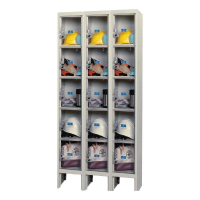
Much like wall and box lockers, clear lockers are also square-shaped and available in various configurations. However, these lockers have clear polycarbonate doors to easily view the contents inside. This style is often preferred in security-sensitive environments like hospitals, jails, police stations, government buildings, airports and schools.
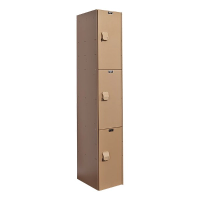
For spaces with moisture or high humidity, opting for plastic lockers is ideal. Made of HDPE, or high-density polyethylene, plastic is moisture impermeable and non-porous, so rust is not a threat. Their construction is low maintenance, easy to clean and impact resistant.
Certifications

GREENGUARD Certified
Products that are GREENGUARD Certified meet the stringent standards for low chemical emissions set by the Greenguard Environmental Institute (GEI), an industry independent organization that aims to improve indoor air quality. Products that are GREENGUARD Certified reduce people's exposure to chemicals and other pollutants, improving overall health. GREENGUARD Certification is GEI's first certification offering.

CPSIA Compliant Lockers
Products that are compliant to the Consumer Product Safety Improvement Act of 2008, or CPSIA, meet the rigorous requirements set by Congress on several hazardous substances commonly found in consumer products, especially products for children ages 0-12. CPSIA regulations enforce restrictions on levels of lead and phthalates, as well as third- party testing by accredited laboratories.



